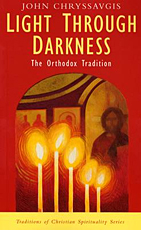John Chryssavgis studied in Athens and Oxford, and has taught theology in Sydney and Boston. He is theological advisor to the Ecumenical Patriarch on environmental issues. This paperback is part of the Orbis series "Traditions of Christian Spirituality." Chryssavgis provides a well-written and in-depth overview of the Orthodox tradition. The eight chapters cover: Orthodox Spirituality, Liturgy and Sacrament, The Wound of Knowledge, Tears and Brokenness, A Silent Tradition, Paths of Continuity, The Book of Nature, and Spiritual Direction. Throughout this erudite work, the author reveals the importance of the vision of God as light, the richness of liturgy as ritual, the beauty of icons, the mystery of the Creator, the way of perfection as deification, and the rigor of asceticism as discipline. In this tradition, the way of surrender and renunciation leads to great bounties beyond description.
In the chapter on Orthodox spirituality, Chryssavgis explores the meaning of Christian detachment as "not allowing either worldly values or self-centeredness to distract us from what is most essential in our relationship with God and with our world." This practice, honed by the desert fathers and mothers, was not done to punish themselves but "in order to discern the value of sharing, the presence of suffering and the intrinsic honor of good things in life." In other words, detachment is seen as an expression of love and as a positive energy that appreciates our connection with others.
Chryssavgis uses a story to illustrate this concept:
"Abba Agathon was once walking with his disciples. One of them, on finding a small green pea on the road, said to the old man: 'Father, may I take it?' The old man, looking at him with astonishment, replied: 'Was it you that put it there?' No, said the brother, 'How, then,' continued the old man, 'can you take up something, which you did not put down?' "
This form of letting go keeps the ego from grasping. Chyssavgis brings this ancient practice to bear on the contemporary problem of the gap between the rich and the poor. He writes: "A truly detached person cannot tolerate creating miserable poverty for the sake of accumulating exorbitant wealth."
Readers will much to savor in the chapter on "Tears and Brokenness: The Way of Imperfection and Spontaneity." Here is a full-bodied and rounded discussion of weeping as a gift, a way, an endowment, and an effort. In his examination of the spiritual practice of silence, the author includes another story:
"There is a quaint Athonite anecdote that relates the disturbance of the monks' morning prayer by the noise of the frogs in a cistern outside their chapel. The elder of the skete went out and rebuked them severely: 'Frogs, would you mind keeping quiet? We've just ended the Midnight Office and are about to start Matins.' To this the frogs replied: 'Perhaps it is you who should be keeping quiet. We've just ended Matins and moving on to the Liturgy!' "
The silence of the monks and the sound of creation ultimately share the same language. John Chryssavgis does a masterful job illuminating the varied practices and the many riches of Orthodox spirituality in this top-drawer paperback. Highly recommended!
